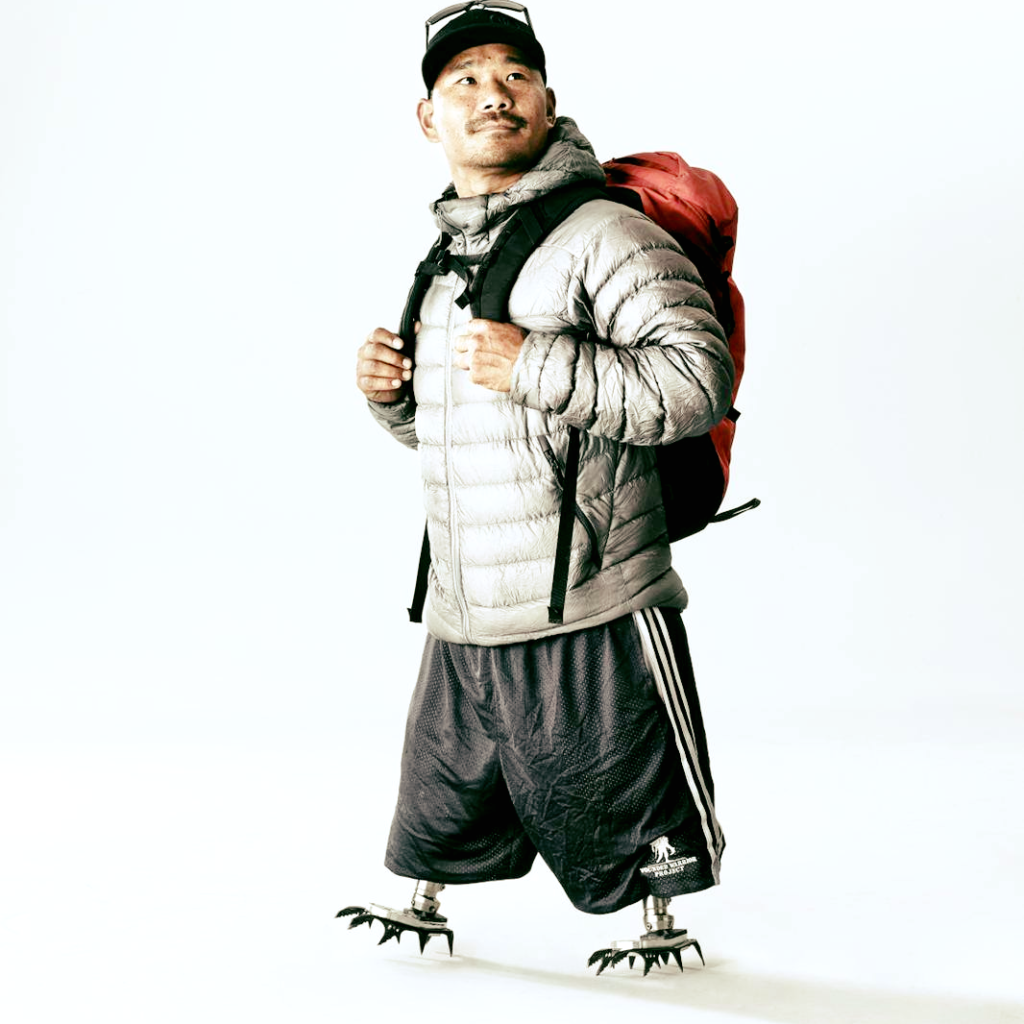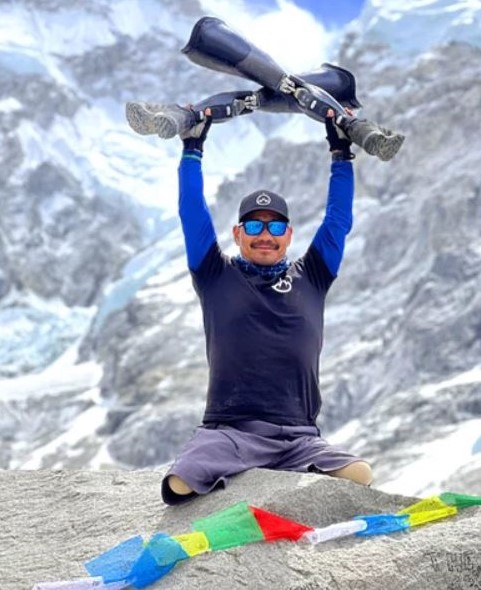A saying is very popular – “If someone says he is not afraid to die, then he is either lying or he is a Gurkha soldier”. Yes, a former Gurkha soldier of the British Army has proved this to be true.
On Friday, May 19, at 3 o’clock in the afternoon, Hari Budha Magar successfully climbed Mount Everest by kneeling on the top of the highest mountain in the world for the first time. Despite losing both his legs in the Afghanistan war, this soldier conquered the world’s highest peak, Mount Everest. In 2010, Hari Buddha Magar lost both his legs after being hit by a landmine in Afghanistan.
Thirteen years after Hari lost both his legs in Afghanistan, Hari has proved that disability is no barrier to reaching the 8,849-meter peak.
A world-class team of Nepali climbers led by the head of Hari’s climbing expedition has said that it is possible.
Apart from this, Mark English from New Zealand in 2006 and Jia Boyu from China in 2018 successfully climbed Mount Everest with iron legs.
Now the world is talking about this achievement of Hari Budha Magar.
After climbing the world’s highest peak, Mount Everest, he returned safely to his base camp. 43-year-old Hari Budha Magar was accidentally hit by a landmine during a patrol in Afghanistan in 2010. Due to which he had to lose both his legs. The accident happened while he was on duty with the Gurkha soldiers in Afghanistan.
When Hari regained consciousness after the accident, he thought he was dead. After proper treatment, Hari, a father of three, took up skiing, golf, cycling, and climbing and his confidence returned.
He started his preparations to climb Mount Everest 11 days ago with the Nepali climbing team led by Krish Thapa. Krish Thapa himself was a former Gurkha soldier and SAS Mountain Troop leader.
Hari Budha Magar’s prosthetic leg was fitted in Britain. He has climbed many peaks including Mount Toubkal in Morocco and Ben Nevis in Scotland and Mont Blanc in Europe with these legs, from kayaking around the Isle of Wight.
His dream was to climb Mount Everest, but his path was blocked by Nepal’s laws that prohibit disabled or blind people from climbing the mountain. In 2018, the Supreme Court of Nepal overturned that law and opened the way for the disabled or blind to climb Mount Everest, and Hari’s dream of climbing Mount Everest was fulfilled.
More than 30 organizations helped to make Hari’s campaign a success.
“Life is all about adaptation, Nothing is impossible.” Hari happily responded after kissing the peak of Mount Everest.

Hari’s Achievements:
1st (DAK) to climb Mera Peak 6,476m
1st (DAK) to climb Ben Nevis with Genium X3s (prosthetic legs)
1st (DAK) to trek to Everest Base Camp with Genium X3s (prosthetic legs)
1st (DAK) to climb Mt Toubkal with Genium X3s (prosthetic legs)
1st (DAK) to climb Chulu Far East 6,058m
One of 1st (DAK) to climb Mont Blanc 4,810m with prosthetic legs
Who is Hari Buda Magar?
As a farming family in Nepal, every two months they would move cattle and this is how he came to be born in a cowshed, in the foothills of the Himalayas, about 2,700m above sea level.
Where he grew up, he could see the mountains of Dhaulagiri and Sisne and found the story of climbing Everest fascinating, but knew very little of how the feat was achieved. All he saw were the black and white pictures of Sir Edmund Hilary and Tenzing Norgay.
He was resilient as a child. He had to cook for himself and was forced to marry, aged 11. He walked barefoot to school across the hills and suffered terrible had headaches, which he now realises was altitude sickness.
He grew up through the brutal civil war where most of those his age went to fight for the rebels, but he was fortunate enough to join the Gurkhas.
Hari joined the British Army at the age of 19 and served with the Royal Gurkha Rifles for 15 years. During his service he saw some of the harshest environments in the world, along with some of the most beautiful.
The Gurkhas are manned by Nepali soldiers & officers, and British officers, it is this blend of cultures that makes the RGR unique. Gurkhas are known for their professionalism, fighting prowess, humour and humility. They have been an integral part of the British Army for over 200 years.
INJURY
While on patrol in Afghanistan in 2010, Hari stepped on an improvised explosive device (IED) and his life changed in a split second. He lost both of his legs above the knee, and sustained multiple other injuries.
Hari’s first thought after the explosion was the safety of his men, his second thought was that he had somehow let them down and failed his mission. As a soldier, Hari was prepared to face death, but he had never considered the possibility that he would sustain life-changing injuries and live to tell the tale.
“I can remember everything about the day I lost my legs. We were on patrol with two aims: to familiarise ourselves with a new area and survey and repair a well, so the locals could get water. It was mid-afternoon on a very hot, sunny day and we were told it was safe. I was wearing 15kg of body armour, radio, water, rations, first aid kit, ammunition, and a spare weapon by my side. I remember the local children asking us for sweets and stopping to give them some.
“Suddenly a loud bang, and the first thing was a ringing in my right ear. My body armour came up towards my face, my right arm was injured and I couldn’t move it. I was looking for a tourniquet to stem the blood and I called for one of my colleagues to help sort me out. My right leg wasn’t there, my left was but dangling as skin and bone.
“Was I going to survive? I didn’t know. As the guys patched me up, I heard them say a helicopter
was inbound in 10mins, so that meant yes, I was going to survive.
“I was second in command to a young officer who I had trained alongside for six months before deploying to Afghanistan. I was the most senior Gurkha, and the squad relied on me to make decisions. When I spoke, they listened. Some of the other junior NCOs were very young and my aim was for them to do the six-month tour, stay safe, and return home. But, after the explosion I couldn’t see that through. When I woke I was filled with shame and I remember saying to the commanding officer – I’m sorry sir.
When Hari woke in the hospital bed, he felt desolate and hopeless. He questioned what kind of life he would be able to lead in the future, and whether it would even be worth living. His mind full of negative thoughts.
“In the days after the injury, I lacked the courage to lift the bed covers to look at my legs. My mind raced with questions – how would I support my family? Will I be in a wheelchair for the rest of my life? Will my wife leave me?
“Back in the UK I started drinking a lot and mixing it with my medication. My brain became foggy. I couldn’t concentrate and my hands shook when I wasn’t drinking. Had I carried on that way, I wouldn’t be here today and I knew that if I left my family on their own they would suffer.”
Hari was ashamed to be seen in public, because he had grown up in a society where many Nepalese believed that those with disabilities had sinned in a former life and the disability was a form of punishment or karma.
“After my injuries, initially I completely lost confidence. In Nepal, disability was viewed, by most people, as if you’d done something wrong in your previous life and now had the burden of the Earth to carry. Instead of helping people with disabilities, they hide them in a corner. I remember waiting in Kathmandu and a lady said: ‘You’ve got fake legs. Why don’t you wear trousers, you’d look normal?’ and I replied: ‘This is normal to me.”
RECOVERY
Hari spent a month in hospital and worked tirelessly over 12 months learning to walk again on his prosthetic legs. With time and determination, Hari took control, regained his self-esteem, and challenged himself to exceed the limitations put on ‘disabled’ people by society.
“Everybody in life has ups and downs, and when they’re low, that’s the time they need help: family, charity, friends, community. It’s make or break. I was privileged to serve in the army and had good prosthetic legs. I was treated by the charity Combat Stress for six weeks. Slowly I started doing sports. It was through golf and the On Course Foundation that I started to get my confidence back and I began to see what I could do physically.”
Since his injury, Hari has battled to rediscover his confidence through an array of sports and adventures. He has done everything from skydiving to kayaking, cycling to skiing, and golf to climbing.
Hari was the first ever disabled person to ski in Nepal, and was one of the first double above-knee (DAK) amputees to kayak around the Isle of Wight. He holds the world record for being the first ever DAK to summit a mountain over 6,000m.
During his rehabilitation, Hari was supported by the following charities and organisations: Gurkha Welfare Trust, On Course Foundation, Blesma, Combat Stress, Pilgrim Bandits, Style for Soldiers, Royal British Legion, Combat Stress, the NHS, Costello Prosthetics. POA Orlando and Ottobok.
A global media for the latest news, entertainment, music fashion, and more.





